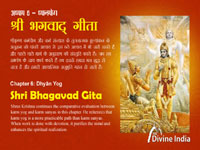

Manōnivr̥ttiḥ paramōpaśāntiḥ sārthavaryā maṇikarṇikā ca |
Jñānapravāha vimalādigaṅgā sāśikāhaṁ nijabōdharūpā. ||1||
Yasyāmidaṁ kalpitamindrajālaṁ carācaraṁ bhāti manōvilāsam|
Saccitsukhaikā paramātmarūpā sāśikāhaṁ nijabōdharūpā ||2||
Kōśēṣu pañcasvadhirājamānā bud'dhirbhavānī pratidēhagēham|
Sākṣī śivaḥ sarvagatō̕ntarātmā sāśikāhaṁ nijabōdharūpā ||3||
Kāśyāṁ hi kāśyatē kāśī sarvaprakāśikā |
Sākāśī viditā yēna tēna prāptā hi kāśikā ||4||
Kāśīkṣētraṁ śarīraṁ tribhuvana-jananī vyāpinī jñānagaṅgā
bhaktiḥ śrad'dhāyaṁ nijaguru-caraṇādhyānayōgaḥ prayāgaḥ |
Viśvēśō̕yaṁ turīyaḥ sakalajana-manaḥsākṣībhūtō̕ntarātmā
dēhē sarvaṁ madīyē ipha vasati punastīrthaman'yatkimasti ||5||
Kashi Panchakam is a famous stotra (a hymn or prayer) that is dedicated to Lord Shiva and is associated with the holy city of Kashi (Varanasi). This stotra consists of five verses or shlokas and is often recited by devotees as an act of devotion and reverence to Lord Shiva and Kashi.
The Kashi Panchakam Stotra touches upon the spiritual significance and sanctity of Kashi, also known as Varanasi or Banaras, which is considered one of the holiest cities in Hinduism. It praises the divine energy and presence of Lord Shiva in Kashi and the city's ability to grant liberation (moksha) to those who die there.
Devotees recite the Kashi Panchakam Stotra with deep devotion, seeking blessings from Lord Shiva and expressing their desire to attain spiritual enlightenment and liberation by visiting and ultimately departing from the sacred city of Kashi. This stotra reflects the deep spiritual connection that people have with Varanasi and Lord Shiva's divine presence in the city.
Overall, the Kashi Panchakam Stotra is a beautiful expression of devotion and reverence for Lord Shiva and the holy city of Kashi, highlighting the profound spiritual significance associated with this sacred place in Hinduism.